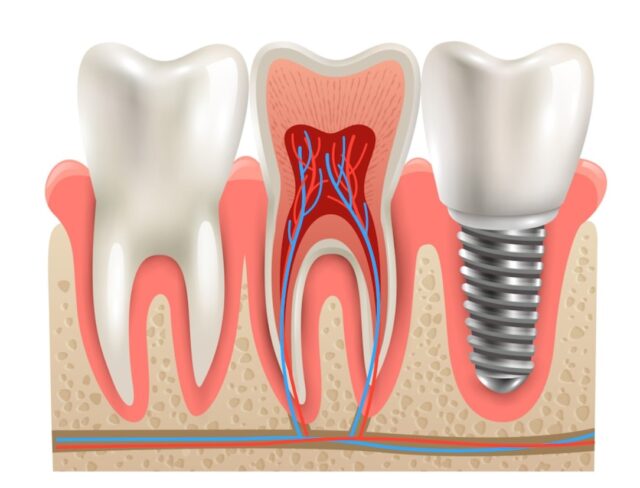
Dental implants are an excellent choice for long-term tooth replacement, but how long do they last? Factors that affect how long they last depend primarily on the patient’s lifestyle and overall dental hygiene. The technology has become so advanced over the years that implant failures due to rejection or functionality issues have become mainly past problems. Pre-existing medical conditions, diseases, and misuse are more likely factors to cause an implant to fail.
What Is A Dental Implant?

It can replace the tooth root of a missing tooth. It is a piece of titanium shaped like a screw. During the procedure, your dentist surgically inserts directly into your jaw, where the root of your missing tooth was.
During the healing phase, your bone will grow around the metal implant. As a result, this will enable it to become stable and serve as the root for your crown or bridge restoration.
Once your bone has fused, your dentist will attach an implant crown or bridge. This restoration will seamlessly replace your missing tooth and complement your smile.
Furthermore, these can also secure a denture in place.
Advantages Of Dental Implants

Many patients undertake the treatment to avoid replacing their missing teeth with dentures.
Here are several advantages.
Helps To Improve Your Speech
Unlike dentures, the restorations allow you to speak clearly and fluently without worrying about your teeth slipping or falling out. Poorly fitted dentures may cause you to slur or mumble your words.
Easier For You To Eat
In most cases, sliding dentures make it very difficult to chew food. The restorations act as if you never had a missing tooth in the first place and provide all the same functions as a freshly grown tooth. As a result, this allows you to enjoy your favorite foods without complications.
High Success Rate
Like all dental treatments, a procedure’s success rate varies from patient to patient.
However, a procedure is known to have a success rate of up to 98%. As a result, they can last a long time, depending on how well you maintain your daily oral health.
Convenience
Once it is fitted, it stays in place, just like a regular tooth. As a permanent solution, they eliminate the process of removing or replacing your dentures frequently.
Enhanced Aesthetics
Dental implants not only restore functionality but also offer enhanced aesthetics. They closely resemble natural teeth in both appearance and feel. Their ability to blend seamlessly with your existing teeth and complement your smile is another significant advantage, boosting your confidence and overall self-esteem.
Components Of A Dental Implant

To fully understand the question “how long do dental implants last,” let’s first lay out the three critical components:
Implant
It is a titanium post that is surgically placed in a patient’s jawbone and acts as a root for the crown.
Abutment
The abutment is attached and holds the crown.
Crown
The crown is a ceramic tooth fastened to the abutment and looks like a natural tooth.
In general, the exposed abutment and the crown are more susceptible to damage than the implant.
How Long Do They Last?

When properly maintained with adequate brushing and flossing, it can last a lifetime, assuming the patient receives regular dental check-ups twice a year. A crown, however, is rated to last about 10 to 15 years before normal wear can cause the tooth to require replacement, although excellent dental hygiene could extend the life beyond 15 years.
Mouth location is also a factor in the expected longevity. Implants in the back of the mouth receive more strain from chewing, which can cause them to fail more quickly than the ones near the front of the mouth.
Know all about dental implants Costa Rica and get it done at the right place, like thedentalconcierge.com.
Dental Implants Vs. Other Tooth-Replacement Options

A dental implant is a permanent solution for missing teeth and has become the standard tooth-replacement option. Unlike dentures, it provides sufficient support that acts as a natural tooth and can withstand biting or chewing without slipping. As they are attached to the interior jawbone, so they’re not subject to decay, and they don’t stress adjacent teeth, both of which are common problems with dental bridges. With this: when comparing dental implants to other tooth replacement options, it’s clear that full arch dental implants provide a comprehensive and long-lasting solution for restoring your smile and oral function.
What Can You Do To Make Them Last Longer?

To last for many years, it takes some essential maintenance. For example:
Brush And Floss Your Teeth
Keep up with good dental hygiene habits. Brush your teeth twice a day and floss once a day. This is recommended for all people, not just those with dental implants. But taking care of your teeth is vital for maintaining them. While it is not susceptible to decay, preserving your other teeth and your gum health directly supports it.
Go To The Dentist Every 6 Months
Routine dental appointments are also crucial for helping your implant last. Keeping your teeth clean and your gums healthy will help them stay solidly in place. These exams also identify potential issues that could jeopardize your implant, such as gum disease.
Avoid Smoking
Smoking is one of the biggest detriments to the health of your dental implant. It restricts the blood flow in vessels in the gums, which can affect the healing process and osseointegration, so your implant may never solidify.
Live A Healthy Lifestyle
Keeping yourself healthy is an integral part of your dental health as well. Bone health is vital because if your bones weaken, your jaw may not be able to support your implant, as well as your other teeth. Take vitamins and supplements, especially calcium and potassium, for bone health, with approval from your doctor.
What Factors Can Cause It To Fail?
They provide long-term, indefinite sustainability when adequately cared for, but several factors can cause an implant to fail prematurely. People with diabetes or a pre-existing medical condition, such as cancer, have a higher risk of failure.
They must be maintained like natural teeth through regular brushing and flossing. In severe cases, poor home care can lead to periodontal (gum) disease, another culprit that can impede the success of a dental implant.
Bottom Line
Your dentists will take care of your dental implants during regularly scheduled check-ups.
To accurately assess the health of your implant, dentists and hygienists need to probe and measure the gums around the implant just the same way they would for natural teeth, check and compare X-rays annually, look for looseness, check the bite, and check all of the components that are attached to make sure that they are functioning correctly.
Get a consultation now from the professionals who think they might benefit from dental implants.









